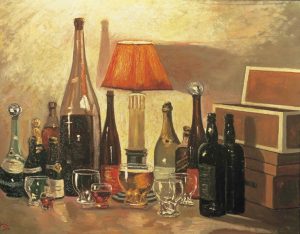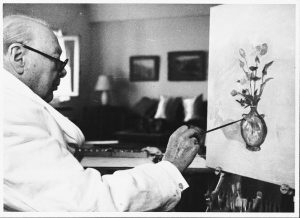
Finest Hour 178
THE FULTON REPORT – From the National Churchill Museum
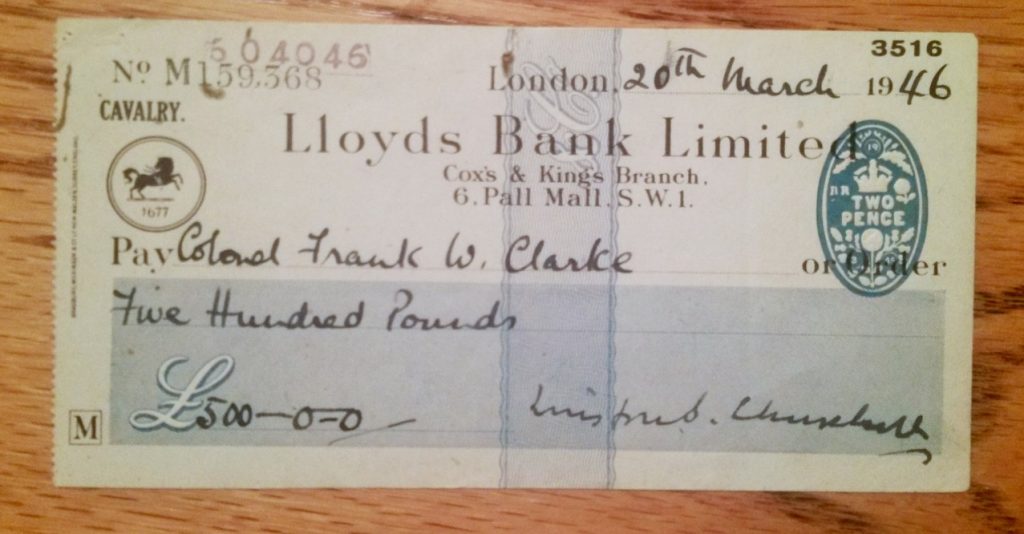
Churchill’s cheque
January 13, 2018
Finest Hour 178, Fall 2018
Page 36
Timothy Riley is Sandra L. and Monroe E. Trout Director and Chief Curator of the National Churchill Museum.
“Both my wife and I stand in need of some rest and sunshine and we hope it would be possible for us to live very quietly indeed with you for some few weeks,” Winston Churchill wrote on 22 November 1945 to his old Canadian friend Col. Frank Clarke, who had a home in Miami. Churchill continued, “The President has asked me to visit Westminster University [sic], Missouri, which is his home state, and deliver an address. He proposes himself to be present and introduce me. This will obviously be a public appearance of considerable importance.”1
Churchill may have believed that a day away from Chartwell was a day wasted, but he wasted little time in asking an old friend for temporary accommodation at his home on North Bay Road in Miami Beach. Like many before him—and countless since— Churchill sought a much-needed and well-deserved period of rest and relaxation in south Florida.
After years of war and three dismal months following his defeat in the general election of July 1945, Churchill received an invitation from Westminster College President Franc McCluer. Churchill’s spirits were buoyed by the now-famous postscript from President Truman: “This is a wonderful school in my home state. Hope you can do it. If you come, I’ll introduce you.”

2025 International Churchill Conference
At once, Churchill accepted the invitation, knowing it was his chance to make an appearance with the American president and deliver a speech of “considerable importance.” What better place, Churchill asked himself, than Miami to rejuvenate, recharge, and prepare for his most significant post-war speech, which he titled “Sinews of Peace” but is now known commonly as the “Iron Curtain” speech?
While a guest of Col. Clarke, Churchill contemplated his message, which would be a stern warning about the threat of Soviet expansion in Europe. But his month in Florida was not all business. Churchill found time to paint amidst palm trees, bathe in the Miami surf, befriend a cockatoo during a visit to the Parrot Jungle and Gardens, and make a brief visit to Cuba, where he was presented with a handsome—and large—humidor stocked with cigars as a “gift from the Government and People of Cuba” [see FH 171].
The Miami sunshine was indeed good for Churchill. He returned to Washington to meet President Truman. The two great leaders with their entourages, including host Col. Clarke, journeyed by railway to Missouri, where Churchill’s speech on 5 March 1946, put Fulton on the world map.
Churchill was indebted to his Canadian friend, who provided not only accommodation in Miami, but also bankrolled the former Prime Minister’s visit. It was a debt that Churchill would repay, but not without complications. On March 26, as he steamed home toward Southampton aboard the RMS Queen Mary, Churchill dashed a letter off to Col. Clarke explaining that he wished to pay his expenses from “sufficient dollars in the First National Bank of New York.”
“Would you be so kind therefore as to send me an account for:
(a) all the railway fares for myself and party,
(b) Sarah’s flight from New York to the south,
(c) the final items at the Waldorf-Astoria and
(d) anything else I owe you including, please, the pressure cooker and the toast-making machine”2
Churchill reiterated his desire to pay Col. Clarke with American funds, imploring his host to hold off on cashing another check: “Meanwhile, please destroy the cheque for £500 which I gave you before I left or advise me if you have already sent it to the bank.”3
The check in question was never cashed and is now deposited safely in the archive at the National Churchill Museum at Westminster College—a reminder of Churchill’s time in Miami Beach in January and February 1946.
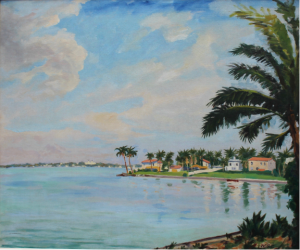
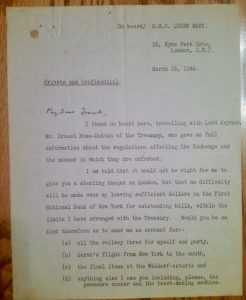
Endnotes
1. Secret Communiqué from Winston Churchill to Col. Frank Clarke, 22 November 1945, Bachmann Collection, National Churchill Museum at Westminster College.
2. Letter marked “Private and Confidential” from Churchill to Col. Frank Clarke, written aboard the RMS Queen Mary in 26 March 1946, Bachmann Collection, National Churchill Museum at Westminster College.
3. Ibid.
Subscribe
WANT MORE?
Get the Churchill Bulletin delivered to your inbox once a month.


